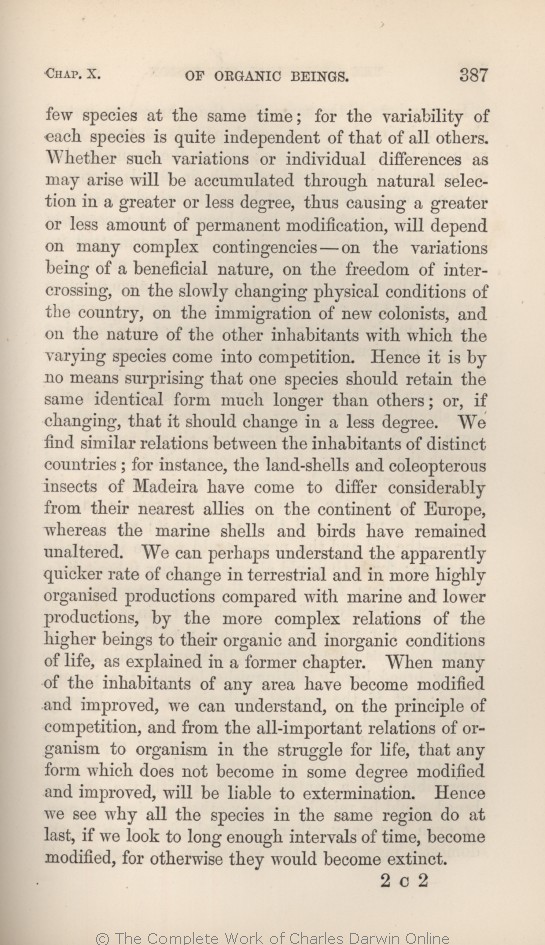for the | for the 1869 1872 | | The 1859 1860 1861 1866 |
| quite 1859 1860 1861 1866 1869 | quite 1872 |
| variations or individual differences as may arise will be accumulated through 1869 1872 |
| variability be taken advantage of by 1859 1860 1861 1866 |
| selection 1869 1872 | | selection, 1859 1860 1861 1866 |
| in 1869 1872 |
| and whether the variations be accumulated to 1859 1860 1861 1866 |
| less degree, 1869 1872 | | lesser amount, 1859 1860 1861 1866 |
| less 1869 1872 | | lesser 1859 1860 1861 1866 |
| amount 1859 1860 1861 1869 1872 | | amount, 1866 |
| of 1859 1860 1861 1869 1872 |
| thus causing a greater or lesser amount of 1866 |
| permanent modification, will 1869 1872 |
| modification in the varying species, 1859 1860 1861 1866 |
| depend 1869 1872 | | depends 1859 1860 1861 1866 |
| contingencies— 1869 1872 | | contingencies,— 1859 1860 1861 1866 |
| variations 1869 1872 | | variability 1859 1860 1861 1866 |
| freedom 1869 1872 | | power 1859 1860 1861 1866 |
| intercrossing, 1859 1860 1861 1869 1872 | | intercrossing 1866 |
| on 1859 1860 1861 1869 1872 | | and on 1866 |
| OMIT 1869 1872 |
| rate of breeding, on the 1859 1860 1861 1866 |
| OMIT 1869 1872 |
| and more especially 1859 1860 1861 1866 |
| immigration 1869 1872 | | nature 1859 1860 1861 1866 |
| new colonists, and on the nature of the 1869 1872 |
| the 1859 1860 1861 1866 |
| come 1869 1872 | | comes 1859 1860 1861 1866 |
| that it 1859 1860 1861 1866 1869 | that it 1872 |
| in a less degree. 1869 1872 |
| less. 1859 1860 1861 1866 |
| find similar relations between the inhabitants of distinct countries; 1869 |
| see the same fact in geographical distribution; 1859 1860 1861 1866 |
| find similar relations between the existing inhabitants of distinct countries; 1872 |
| ..... 1869 1872 | | in 1859 1860 1861 1866 |
| have 1869 1872 | | having 1859 1860 1861 1866 |
| any area 1869 1872 | | a country 1859 1860 1861 1866 |
| from the 1869 1872 |
| on that of the many 1859 1860 1861 1866 |
| organism 1869 1872 | | organism, 1859 1860 1861 1866 |
| in the struggle for life, that 1869 1872 |
| that 1859 1860 1861 1866 |
| does 1859 1860 1861 1866 1869 | | did 1872 |
| will 1859 1860 1861 1866 1869 | | would 1872 |
| ..... 1866 1869 1872 | | be 1859 1860 1861 |
| extermination. 1866 1869 1872 | | exterminated. 1859 1860 1861 |
| ..... 1869 1872 | | can 1859 1860 1861 1866 |
| long 1869 1872 | | wide 1859 1860 1861 1866 |
| modified, 1861 1866 1869 1872 | | modified; 1859 1860 |
| otherwise they would 1869 1872 |
| those which do not change will 1859 1860 1861 1866 |
|









